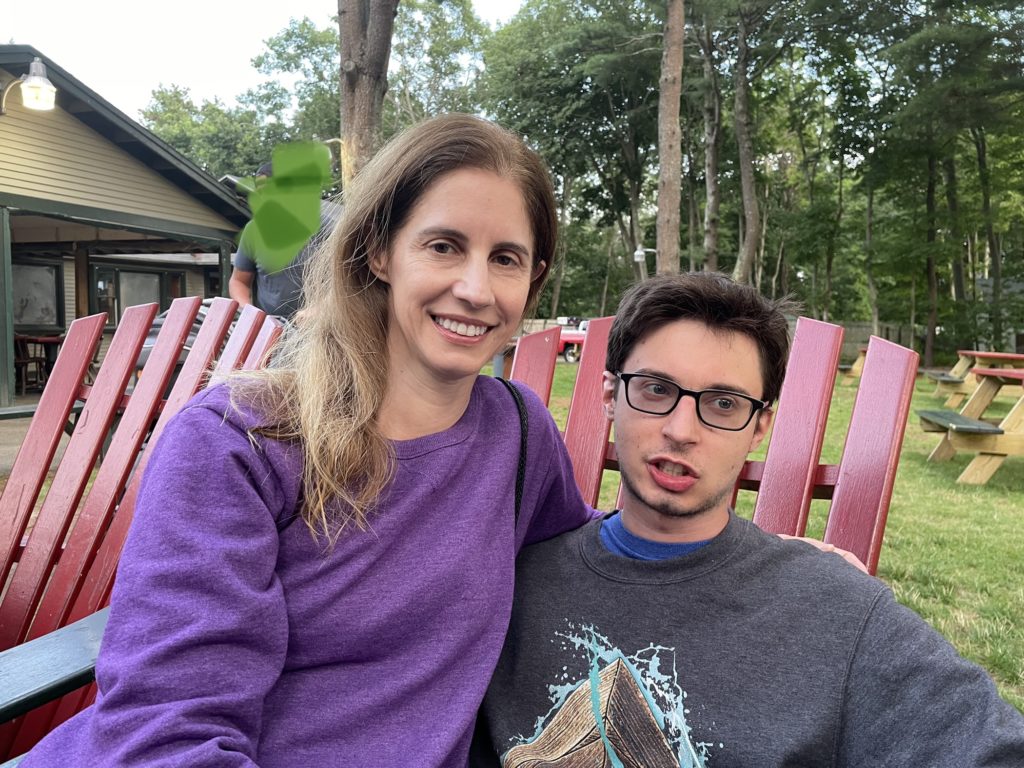
Hi there fellow mom,
I too have an autistic child, except he’s not a child anymore. His name’s Diego and he’s 27.
You’ll go through various stages when it comes to how you view your child and his autism. I’ve been through every stage in the book so I thought I’d share how it’s gone for me, at least up to now. I hope knowing what to expect will save you some anguish.
You’ll obsess about scores and tests, and pray that the gaps between below average and average will narrow. One day, you’ll realize testing serves only one purpose: advocating for your child. You’ll also understand that scores measure what matters to society, not what matters to your child.
You’ll feel sick before, during, and after important school meetings. I for one had to excuse myself and head to the ladies’ room right before every IEP meeting!
You will not resist the power of denial.
I was convinced I’d fix Diego and he’d be exited from special education, go to college, and just be quirky. I held on to this idea for so long you could say I was delusional.
Anyway, Diego wasn’t “fixed”. He’s still autistic and intellectually disabled.
And so, when Diego aged out of public education, instead of going to college, he accessed new agencies and systems.
I felt the familiar panic that surfaced at each of Diego’s transitions. I also learned new acronyms: DDS (Department of Developmental Services), SSI (Social Security Income), LON (Level of Need), to name just three.
God only knows if you’ll need to know these. If you do, I’m here to tell you this:
There’s no need to panic. It will be OK.
Here’s something else: You’ll argue a lot with your child’s other parent. My husband and I even disagreed on whether there was anything “wrong” with Diego up until he was nearly three.
You’ll think you have it worse than everyone else.
In case you’re not aware, relationship problems are actually no less frequent for partners with perfectly “normal” kids.
There’s even solid research supporting this claim. If you want to read it, here’s the link: The Relative Risk of Divorce in Parents of Children with Developmental Disabilities: Impacts of Lifelong Parenting. If you don’t, here’s the study’s conclusion: “We found that divorce rates were not elevated, on average, in families with a child with developmental disabilities.”
At times, you’ll think you’re crazy.
For a good while, only I had concerns about Diego. Everyone else said he was just a late bloomer. As my own mom would point out, the neighbor’s son had not spoken until he was three for chrissakes, and he turned out fine.
When Diego lined up his little toys, he was “obviously” engaged in some interesting geometric feat, my sister insisted. He went berserk when we took a different route to get to my mom’s house because he was “so smart”-my husband claimed- he had learned the way already.
C’mon Daniella, he’s just a toddler!
Anyhow, if Diego’s at all like your child or you’re at all like me, perhaps you’ve moved beyond this God-awful, I-must-be-crazy stage already.
As it is, this stage passes relatively early because other less emotionally attached adults will enter your child’s life.
You’ll feel guilty for not doing enough for your autistic child and for neglecting your other kids. You’ll feel guilty when you lose it. I actually pushed Diego into a pool once because he was driving me nuts. And I bit (yes, bit, with my teeth!) his forearm when he threw a wild tantrum at a store.
Guilt was the one emotion that pulverized my heart.
Fellow mom, if there’s anything I wish for you, it is that you learn to forgive yourself quickly. Your child will.
Plus, somehow, something extraordinary will happen. Your parenting experience will evolve so it isn’t frightening anymore. It will still be hard, exhausting, exasperating, and frustrating, but not a constant source of fear and anxiety.
You might accept, embrace, celebrate or even love aspects of your child you thought you had to battle and extinguish.
He’ll teach you about different kinds of minds.
You’ll learn that financial and physical independence is not the purpose of any life.
Your autistic child might even help you glimpse this truth: that LOVE is the ultimate goal. Love and compassion toward all beings, including yourself.
That’s been the case for me.
Trust me on this: Wherever you are in your journey as a mother, how you feel about it will change. Heck, mine will too. I might write you a letter about it when Diego’s 50.
Until then, take good care,
Daniella
Originally published by Autism Parenting Magazine at www.AutismParentingMagazine.com.

